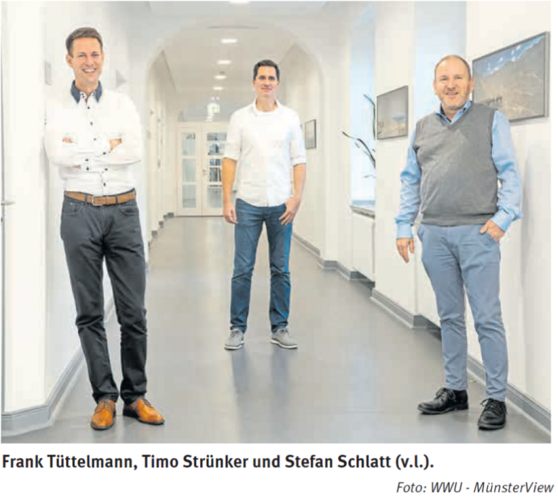July 2022 - Winner of the Science4Life Venture Cup 2022

Team "CatSper" won first place at the business plan competition from the start-up initiative Science4Life in Frankfurt (a.M.). The competition included the submission of a formal business plan and a presentation in front of a panel of experts. The link to the competition
October 2021 - The BRZ-Award for young research goes to...

For his presentation at the 9th DVR Congress, Dr. Christian Schiffer received the "BRZ Award for Young Research" from the Berufsverband reproduktionsmedizinischer Zentren Deutschlands e.V. (Professional Association of Reproductive Medicine Centers in Germany) on behalf of the entire team involved in the development of the novel CatSper test.
The award is endowed with a five-digit sum for the production of a documentary film, which is intended to present our work to the public as well as to experts. We are very grateful and proud to receive this great honor and are already looking forward to filming.
August 2021 - Medical Faculty News

From left: Vincent Fischer und Samuel Young
***Unofficial English translation***
Infertility – this is the diagnosis confronting one in seven couples in Germany wishing to conceive. To make matters worse, the cause of infertility often remains a mystery after the standard examinations have been completed – in the case of men, this is the semen analysis. In roughly one third of men diagnosed as infertile, the number, motility, and morphology of the sperm appear completely normal. With no clear cause of infertility, these men are initially advised to continue attempts to conceive naturally before ultimately undergoing various fertility treatments with no guarantee of success. This is where the research group of Prof. Timo Strünker from the Centre for Reproductive Medicine and Andrology (CeRA) at the University of Münster comes into play: embedded in the Clinical Research Group “Male Germ Cells,” his research team, led by Dr. Christian Schiffer, has developed a novel laboratory test that could soon find its way into clinics.
The test determines the activity of the CatSper protein in the sperm flagellum: CatSper enables sperm to penetrate the protective coating of the egg. Lack of CatSper activity leads to infertility – affected men can only conceive a child with the assistance of the ICSI method, in which a single sperm is injected directly into the egg. All other available therapies are doomed to fail. In order to help affected couples, CatSper function must first be detected; however, not only does CatSper dysfunction remain undetected by the semen analysis but also does not manifest itself through physical symptoms because CatSper is found exclusively in sperm.
In a pilot study at the CeRA, a prototype of the CatSper test was used to examine the sperm of several hundred men: Preliminary results indicated that around 1.5 percent of the men with an otherwise typical semen analysis were infertile due to CatSper dysfunction and could only conceive a child with ICSI therapy. "The CatSper test has already proven its medical potential. It provides unambiguous and easily interpretable results for the diagnosis of CatSper-related male infertility in just 30 minutes, thereby guiding the couple to an individualized and promising fertility treatment," said Prof. Sabine Kliesch, Chief Physician of the Department of Clinical and Operative Andrology at the CeRA. "I see the CatSper test in the future as a standard addition to routine semen analysis in andrological laboratories."
The potential of the CatSper test, which was developed in close collaboration with the Institute of Reproductive Genetics, the Department of Clinical and Operative Andrology and the Fertility Center of the University Hospital of Münster, has also convinced the German Federal Ministry of Economic Affairs and Energy: Granted almost 650,000 € from the funding program "EXIST - Existenzgründungen aus der Wissenschaft", a team from the natural sciences, medicine, and business administration is now the driving force for the development of the test prototype into a market-ready in-vitro diagnostic device. "During the project's 18-month period, we will collect the data necessary for market entry through extensive clinical and analytical performance evaluation studies,” said project leader Dr. Schiffer. “This step is crucial to be able to offer this innovative test to patients seeking fertility assistance in Germany and abroad."
October 2020 wissen|leben - The Univeristy of Münster newspaper "When sperm go astray"

Our research was featured in the University of Münster newspaper!
Our research and the new CatSper test were featured in DER SPIEGEL magazine

The Infertile Man - The fight against an overlooked public health crisis
By Barbara Hardinghaus and Maik Großkathöfer
-An excerpt from the article-
...The egg releases messenger substances, hormones that are like signposts for the sperm. This is how they orientate themselves in the female genital tract. Just as immune cells detect bacteria in the blood, spermatozoa are able to detect the egg. To do this, they have a sensor in the membrane of their tail, a protein called CatSper. If this protein is dysfunctional, the man is infertile. Strünker has developed a rapid test that has been used in Münster for about a year. A pipette is used to drop ejaculate into two vials. Then you wait for half an hour. If the sperm cease to swim, they are healthy - they stop moving because they do not pick up any signals from the egg cell. Spermatozoa with a defective receptor keep searching...
Our research made the highlights at the 8th conference of the Association of Reproductive Biology and Medicine (DVR)

A rapid test for "blind" sperm in pilot study
A relatively simple, new sperm test could spare certain infertile couples who want to have children an arduous journey: Men are identified whose sperm cannot naturally fertilize an egg cell – although all semen parameters are completely normal. Only one small component is dysfunctional, an ion channel in the cell membrane. The only way to overcome this defect is to inject a sperm cell directly into the egg.
2020_Q1 | german research Magazine of the Deutsche Forschungsgemeinschaft „Leave No Man Behind“


The burden of involuntary childlessness, carried by millions of couples worldwide, is caused by either male or female infertility. However, for traditional and social reasons research on male reproductive health was neglected for a long time. Now the “forgotten man” experiences his well-deserved renaissance.
Unfulfilled desire for children: treatment and research of male infertility at the Univeriversity Hospital Münster

To play the video, it will be loaded from a Webserver of Google™ LLC. Therefore data will be transmitted to Google™ LLC.
Load Video and transmit dataLoad Video and transmit data10. May 2019 Wissenschaftskommunikation | "We must make a distinction between results and possible interpretations"

Scientific data can be misunderstood. This was the experience of chemist Christian Schiffer when he published his research results and saw the subsequent headlines used to describe it. From absolutely right to quite wrong. What he has learned from this, he tells in an interview.
Focus Magazin Wissen | Sperm Alert

Men in the western world produce only half as many sperm as 40 years ago. If this continues, they will be sterile by 2050. What is endangering their potency?
Dr. Christian Schiffer wins the "KlarText-Prize" of the Klaus-Tschira-Stiftung

To play the video, it will be loaded from a Webserver of Google™ LLC. Therefore data will be transmitted to Google™ LLC.
Load Video and transmit dataLoad Video and transmit dataReport about our research on uni-bonn.tv

To play the video, it will be loaded from a Webserver of Google™ LLC. Therefore data will be transmitted to Google™ LLC.
Load Video and transmit dataLoad Video and transmit data
